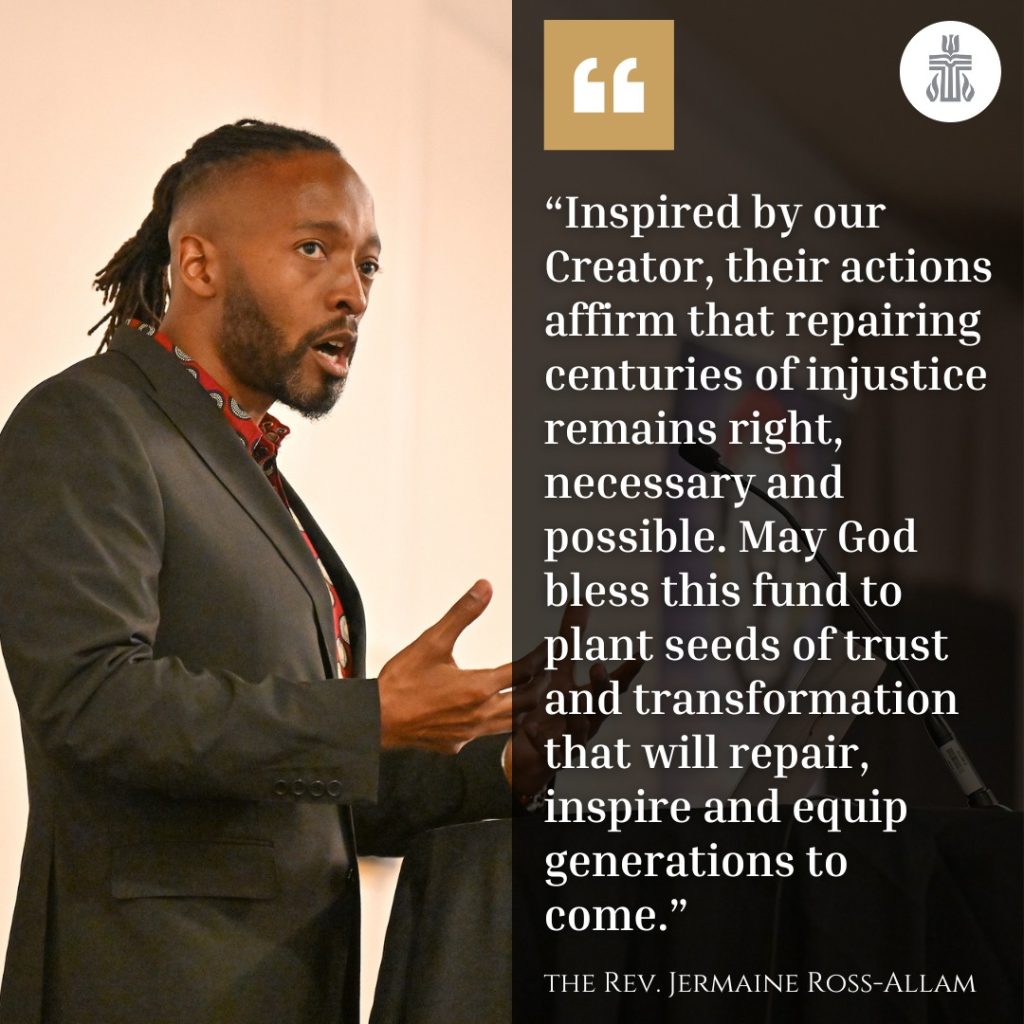In the News
- Baltimore Presbyterians offer reparations for the slavery Trump wants to erase – Baltimore Brew, 9/16/25
- Presbytery of Baltimore votes to form historic Reparative Justice Fund – Baltimore Fishbowl, 9/16/25
- Presbytery of Baltimore approves groundbreaking reparative justice fund – PC(USA), 9/13/25
FOR IMMEDIATE RELEASE
Baltimore, MD – September 13, 2025 – The Presbytery of Baltimore took a historic step today by approving the establishment of a Reparative Justice Fund at its 908th Stated Meeting. This action, believed to be the first of its kind by a presbytery in the Presbyterian Church (U.S.A.), affirms our commitment to truth, repair, and reconciliation in response to the enduring harm of slavery and systemic racism.
The Reparative Justice Fund is designed to provide direct support to African American congregations and communities within the Presbytery’s bounds, with a focus on empowerment, self-determination, and healing. Six historically Black congregations: Cherry Hill Community, Grace, Knox, Lochearn, Madison Avenue, and Trinity Presbyterian Churches will receive initial priority in recognition of their historic underfunding and exclusion. At least one-quarter of the Fund’s resources will be directed toward these congregations, while additional disbursements will support community-based initiatives rooted in equity and justice.

Unlike traditional grant programs, the Reparative Justice Fund will be governed by an independent nonprofit board of directors. Members of the incorporating Board will be nominated from within the Presbytery as well as African American leaders serving in historically Black communities across the region. This ensures that the distribution of funds will be led by those most directly impacted by historic inequities, reflecting the core principle that reparations must be shaped and guided by the communities they are meant to serve.
To seed the Fund, the Presbytery is committing 15 percent of its unrestricted net assets, in addition to 15 percent of designated mission and urban ministry funds. These resources will be disbursed in two equal installments in 2026 and 2027. Moving forward, the Presbytery’s Manual will be amended so that 10 percent of net proceeds from all property sales will flow into the Fund, providing a sustainable and long-term source of support. The Reparative Actions Fund Reserve, created several years ago from the legacy of The Center, will also be incorporated into this effort, unifying the Presbytery’s commitments under one banner of repair.
The action comes after years of prayerful discernment and study led by the Presbytery’s Dismantling Racism Team. Beginning in 2022, the Team engaged in broad consultation, studied denominational precedents, and listened deeply to congregations and community voices. Their recommendation emphasized the need to move beyond charity toward repair, grounding the proposal in the theological conviction that repentance requires both confession and action.
“This Fund is more than a symbolic act—it is a faithful witness to the gospel,” said General Presbyter Rev. Dr. Jacqueline Taylor. “Reparations name the harm, affirm dignity, and open the way to a more just future. Through this Fund, the Presbytery of Baltimore is aligning its resources with its faith, living out God’s call to mend what has been broken.”
The Reparative Justice Fund also builds on actions of the broader denomination. In 2022, the 225th General Assembly of the Presbyterian Church (U.S.A.) adopted an overture titled An Apology to African Americans for the Sin of Slavery and Its Legacy, which called on presbyteries to examine their complicity in slavery and systemic racism and to take tangible steps toward repair. The Presbytery of Baltimore endorsed this action at the time and began to study how it might live into its commitments in practical ways. Today’s vote represents a major milestone in the fulfillment of that process.
By creating this Fund, the Presbytery of Baltimore joins a growing ecumenical movement in the region and beyond. The Episcopal Diocese of Maryland, the Synod of the Lakes and Prairies, and several universities have taken similar steps, signaling that reparations are increasingly recognized as both a moral imperative and a faithful witness to justice. Baltimore’s action stands out, however, for its scope and its structural independence, setting an example for other presbyteries across the country.
Implementation of the Reparative Justice Fund will begin in 2026, when the independent board is formally established and the first disbursements are made. In the meantime, the Presbytery will continue to provide educational resources, invite congregational engagement, and nurture relationships across communities. In this way, the Presbytery acknowledges that the work of repair is not a one-time act but an ongoing spiritual and institutional commitment.
“It is exciting to see this critical work progress. This is not only a historic moment for Baltimore Presbytery—it is a long awaited new beginning,” said Rev. Jermaine Ross-Allam, Director of the PC(USA) Center for the Repair of Historic Harms. “Inspired by Our Creator, their actions today affirm that repairing centuries of injustice remains right, necessary, and possible. May God bless this fund to plant seeds of trust and transformation that will repair, inspire, and equip generations to come.”
About the Presbytery of Baltimore
The Presbytery of Baltimore supports more than 60 congregations and ministries across Central Maryland, encompassing Baltimore City and surrounding counties. Committed to reconciliation, justice, and faithful witness, the Presbytery seeks to follow Jesus Christ by encouraging, challenging, supporting and equipping its leaders and churches.
# # #
Help Launch the Work of Reparative Justice
Learn More
Background Documentation
+ Motions to Create the Reparative Justice Fund
+ Reparative Justice Fund Proposal – Final version
+ Reparative Justice Fund FAQ – Updated
+ Reparative Justice Fund Timeline (Past & Future)

